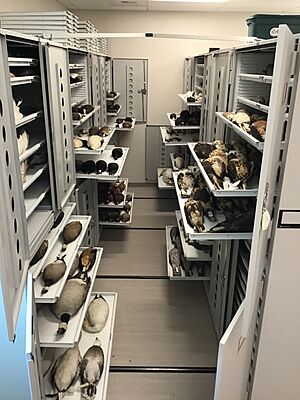Philip L. Wright Zoological Museum facts for kids
The Philip L. Wright Zoological Museum (UMZM) is a special place at the University of Montana in Missoula, Montana. It's like a huge library for animals, but instead of books, it holds a collection of preserved animal specimens. You can find it on the second floor of the Health Sciences building.
Contents
What is the UMZM?
The Philip L. Wright Zoological Museum is the biggest animal collection of its kind in the area. It's a very important place for scientists and students to study animals. The museum also welcomes visitors, including schools and other groups, to learn about its amazing collections.
Amazing Animal Collections
The museum has a huge collection of different animals. Imagine this:
- Over 14,500 mammals (like bears, deer, and small rodents)
- About 7,000 birds
- Around 3,200 fish
This makes it the largest museum of its kind between Eastern Washington University and Minneapolis, Minnesota. It has one of the best collections of Northern Rocky Mountain wildlife anywhere in the world! While the museum focuses on local animals, it also has specimens from all over the globe. Some of its oldest items date back to 1851, from a place called Leningrad, Russia (now St. Petersburg).
The Brain Scoop Videos
In 2012, a volunteer named Emily Graslie started a series of videos on YouTube called The Brain Scoop. These videos showed off many of the cool specimens at the museum. The show became very popular and later moved to the Field Museum in Chicago.
History of the Museum
The University of Montana started collecting animal specimens way back in the 1890s. Early contributions came from important people like Morton J. Elrod. He was a founding biologist and professor at the university. He also started the Flathead Lake Biological Research Station in 1899, which is another important research center.
Dr. Philip L. Wright's Legacy
On September 1, 1939, Dr. Philip L. Wright took charge of the museum. He was incredibly dedicated to growing the museum's collections and continued this work until he passed away in 1997. Because of his hard work and dedication, the university renamed the museum in his honor that same year.
Who Runs the Museum Now?
The museum is currently led by a curator, Katrina Derieg, who started in January 2025. The museum also relies on the help of university students who work as interns and many dedicated volunteers.
 | James Van Der Zee |
 | Alma Thomas |
 | Ellis Wilson |
 | Margaret Taylor-Burroughs |


